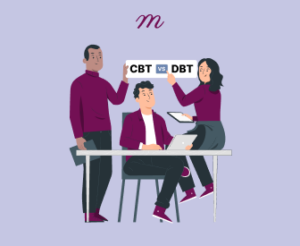Are you considering starting a private counseling practice? It can be both exciting and nerve-wracking. There are many factors to think about before putting up your sign. How much will it cost to start? Should you go virtual or rent office space? What tools and resources will you need to succeed? With the increasing demand for counseling services, private practice has become an attractive option for many mental health professionals. However, starting a private practice also requires considering costs, legal implications, marketing, business management, and financial planning.
In this blog, we will guide you through starting a private practice that will enable you to provide top-notch care to your clients while keeping costs in check. From expenses like rent, insurance, and marketing to the benefits and drawbacks of virtual versus physical locations, we will cover all the essential details. Furthermore, we will introduce you to cutting-edge tools like Mentalyc, an AI tool that can help you save time on paperwork so you can focus more on your clients.
Although it can be challenging, starting your own practice is a rewarding experience. With the right mindset and resources, you can achieve your dream of being your own boss. Let’s begin!
Licensing and Certification Requirements
Starting a counseling practice can be difficult, but it can also be very fulfilling. It’s essential to carefully research your state’s requirements and give yourself enough time to complete the necessary education, exams, and paperwork. You can build a successful private practice with the proper credentials and a passion for helping others. However, you must also meet your state’s licensing and certification requirements, which usually involve the following:
Education and Degree
- Obtain a master’s or doctoral degree in counseling, psychology, or a related field from an accredited university.
- Complete several supervised clinical experiences, usually around 2,000 to 4,000 hours.
Exams
- Pass your state’s licensing exam, such as the National Counselor Examination (NCE) or the Examination for Professional Practice in Psychology (EPPP).
- Some states require additional exams on laws and ethics.
Internship or Residency
- Complete a 1 to 2-year internship or residency, where you gain experience under the supervision of a licensed professional. This provides the necessary hours of supervised experience.
Background Check
- Undergo a criminal background check. Felony convictions may prevent you from becoming licensed.
Continuing Education
- Complete regular continuing education to maintain your license, typically around 20 to 40 hours every 1 to 2 years. Stay up-to-date with best practices in counseling and mental health.
How Much Will It Cost to Start a Private Practice?
While starting a private practice isn’t cheap, the rewards of helping clients in a setting you control make it worthwhile for many counselors and therapists. Opening a physical counseling practice may cost between $10,000 to $50,000 in the first year. Take note of the following information as well:
- Rent will likely be your most considerable expense. Renting a small office or therapy room can cost $500-$3,000 per month, depending on where you live. Virtual teletherapy practices are more affordable, around $100-$500 monthly.
- Insurance and licensing fees. Malpractice insurance for counselors averages $2,000-$5,000 per year. State licensing fees are usually a few hundred dollars.
- Marketing. You’ll want to invest in a website, business cards, online listings, and possibly ads to help clients find you—budget at least $1,000-$3,000 to get started.
- Equipment. A laptop, therapy chairs, whiteboard, tissues, and a clock can add up to $2,000 or more.
- Administrative support. If you hire an assistant to handle scheduling and billing, expect to pay at least $30,000 annually. Doing it yourself saves money but takes time away from clients.
Choosing Between a Virtual or Physical Practice
Deciding whether to open a virtual private practice or a physical office space is a significant decision that requires careful consideration of the pros and cons based on your needs and budget.
Opting for a virtual practice from home can help you save overhead costs, such as renting office space and purchasing equipment. You can connect with clients via video chat from any location with a stable internet connection. This flexibility and cost-effectiveness can be attractive, particularly if you’re just starting. However, some clients and therapists prefer in-person sessions, and building rapport may be more challenging remotely.
On the other hand, a physical practice provides dedicated office space for meeting with clients face-to-face. Although this option is more expensive, many find it the ideal setting for counseling and psychotherapy. If budget is a concern, consider starting with a small office rented by the hour or day until your practice is established, or explore shared office spaces with other therapists.
Ultimately, it’s essential to consider the experience you want to provide for your clients and what will enable you to deliver your best work as a therapist. If cost or work-life balance is a concern, there are ways to slash expenses and prevent burnout as you grow your practice. What matters most is taking that first step and opening your virtual or physical doors. Your clients will appreciate it!
Equipment and Supplies Expenses
Starting a private counseling practice requires investing in the necessary equipment and supplies. The costs can depend on whether you opt for a physical or virtual practice.
If you choose a physical location, you must purchase furniture such as desks, chairs, a couch, lamps, and decor to create a welcoming environment. Also, add a whiteboard, bookshelves, a water cooler, or a mini fridge for your clients. These items can range between $500 to $5,000 or more, depending on the quality.
For a virtual practice, the costs will mainly be technology-related. You’ll need a computer, webcam, microphone, and high-speed internet. Additionally, you may require an extra monitor, web conferencing software like Zoom, online scheduling tools, an electronic health records system, and billing services. These tech tools may cost between $500-$2,000 upfront and monthly subscription fees of $50-$200.
Other standard supplies for any practice include:
- Business cards – Around $50 to print
- Stationery and forms – $0-200 to print or purchase templates
- Marketing materials – $0-500 for flyers, social media ads, website, etc.
- Office supplies – $50-200 for pens, paper, folders, printer ink, etc.
When cutting costs, it’s best, to begin with the essentials and gradually add on as needed. Consider checking with nearby colleges or libraries to see if they offer low-cost or free office space. Purchasing used furniture and technology can also help save money. Creating your marketing materials and forms can be a cost-effective solution, and taking advantage of free web services whenever possible can further reduce expenses.
Marketing Costs to Build Your Client Base
After acquiring the essentials, promoting your new practice is crucial. The growth and success of your practice heavily rely on effective marketing and networking to draw in clients.
Create a Website
Having a professional website is crucial for establishing your market presence. It serves as a platform for potential clients to get to know you better by showcasing your experience, credentials, and services. It is crucial to provide detailed information about your therapy approach, fees, insurance providers you work with, and a simple contact form. Optimizing your website with relevant keywords can significantly improve its visibility on search engines.
Social Media
In today’s age, social media has become a popular platform for people to find service providers. You should create profiles for your practice on social media platforms such as Facebook, LinkedIn, Instagram, and Twitter. Share blog posts, uplifting words, and informative details about your services. Interact with others by commenting on and sharing their posts, and take the time to make sincere connections with potential clients, colleagues, and community organizations.
Referrals
One of the effective ways to grow your customer base is through referrals from happy clients and healthcare professionals in your vicinity. You can offer attractive incentives, such as discounts or gifts, to those who successfully refer a new client to your business. This approach can help boost your revenue and strengthen your business’s credibility and reputation in the community.
Networking Expanding your professional network is a lifelong pursuit. You can begin by connecting with locals who share your interests, attending industry events, and speaking at nearby schools or religious organizations. Writing articles for industry journals also boosts your visibility. Being active in your community increases your chances of being discovered by potential clients.
Building Your Team
Gradually building your support team is crucial for the growth of your practice. Start by addressing the most pressing needs, such as scheduling or billing assistance. As your caseload and revenue increase, you can assess whether hiring more staff, such as an office manager, would be beneficial. The goal is to strike the perfect balance of support that allows you to spend less time handling administrative tasks and more time counseling your clients.
Virtual Receptionists and Online Scheduling
For virtual or hybrid practices, a virtual receptionist service can handle your scheduling and intake calls for a fraction of the cost of an in-house employee. They charge between $200 to $500 per month. An online scheduling tool like Calendly, Schedulicity, or Booker can also automate appointment booking for your clients 24/7. These services typically cost between $10 to $50 per month.
Billing and Accounting Help
If managing insurance billing, claims, and bookkeeping seems overwhelming and takes up too much of your time, hiring a part-time biller or accountant may be beneficial. This can guarantee that your revenue cycle runs smoothly and you receive accurate and timely payments. A qualified professional can cost between $25,000 to $50,000 per year. However, more affordable options exist, such as utilizing a billing service or hiring a freelance medical biller.
Deciding to use a Billing Company or EHR
When it comes to billing and electronic health records (EHR), there are several options available for you to consider. It is a crucial decision that demands careful consideration. Your choices include:
- Handle billing and records manually. This is time-consuming but cost-effective. You’ll need to keep physical files, send paper statements, and follow up on payments.
- Use a billing company. They handle billing clients and insurance companies and follow up on payments for a percentage of the revenue. This frees up your time but reduces profit. Well-known options include Bill.com and Square.
- Invest in EHR software. They streamline billing, scheduling, client records, and more. Pricing varies but typically charges a monthly subscription fee.
Do You Need an Office Manager?
You can focus on your clients as a therapist by delegating day-to-day logistical tasks to an office manager. These tasks include booking appointments, billing insurance companies, maintaining client records, and general office administration. Office managers usually charge between $30,000 to $50,000 per year. If this is outside your budget, consider hiring a part-time office assistant to assist you for 10-20 hours a week.
The options you choose depend on your budget, technical skills, and how much time you want to spend on administration versus counseling. A combination of EHR software and a billing company is a popular middle ground. They handle the essentials so you can build your practice, but you maintain control and access to client records. Whatever you decide, factor the costs into your business plan and fees. Running a private counseling practice is rewarding, so avoid burnout by reducing administrative tasks when possible.
Save Time with AI Tools Like Mentalyc
It is common for counselors to spend a significant amount of time on administrative tasks such as writing progress notes. However, Mentalyc, an innovative AI-powered tool exclusively designed for therapists, can significantly reduce this workload. This cutting-edge software generates personalized progress notes that are EHR compatible and based on the counselor’s unique responses. By utilizing Mentalyc, therapists can save several hours each week and redirect their time and energy toward providing high-quality care to their clients.
- Save an average of 3-5 hours per week writing notes.
- Customized to your needs. You determine the content and level of detail in each note.
- Keep records organized. All notes are stored in one place, so you have a complete work record with each client.
Mentalyc offers an affordable subscription for solo practitioners and group practices. We also provide a free 30-day trial so you can experience the time savings for yourself. Making the most of tools designed specifically for counselors and the work you do will give you more time to devote to your clients and your practice. Give Mentalyc a try today—your time is valuable, so use it wisely.
Starting a private counseling practice can be daunting, but with proper planning and preparation, you can make your dream of helping clients in your own space a reality. It’s crucial to conduct thorough research, create a solid business plan, and start small if necessary.
Building a successful practice requires realistic expectations, choosing a sustainable business model, using efficient tools, and committing to ongoing learning and self-care. Although the initial investment may seem steep, the rewards of building a practice based on your values and expertise will make it all worthwhile. Believe in yourself, and don’t look back. Your clients are out there waiting for you. Take the first step towards turning your vision into a reality, and your future clients are sure to be grateful.
You Must Be Thinking!
How much will it cost to get my private practice started?
When beginning a private practice, spending between $5,000 and $10,000 on essential expenses such as liability insurance, office space, furniture, and billing software is common. Virtual practices tend to be less expensive. If opting to rent office space, it is recommended to budget between $500 and $1,500 per month for a small area.
- Liability insurance: $500-$2000/year
- Billing software: $50-$200/month
- Marketing: $200-$500/month for website, social media ads, etc.
Do I need a business plan?
Creating a well-structured business plan before launching your practice is an essential step that can help you assess the feasibility of your idea and aid you in making informed decisions early on. Your plan should cover key aspects such as:
- Your mission and vision for the practice.
- Target market and how you’ll reach them.
- Operational details like business structure, location, and staffing.
- Financial projections for the next 3-5 years.
- Risks and how you’ll mitigate them.
How do I handle scheduling and billing?
Utilizing HIPAA-compliant practice management software can simplify your workload. This software can manage scheduling, billing, progress notes and even integrate with electronic health record (EHR) systems and billing services.
Many therapists offer a complimentary first consultation and charge between $100-$200 for a 50-minute session. If affordability is a concern, you may be able to find sliding-scale or pro bono options as well. Additionally, providing teletherapy services in addition to in-person sessions could be a worthwhile consideration.
Disclaimer
All examples of mental health documentation are fictional and for informational purposes only.
Why other mental health professionals love Mentalyc

“For anyone hesitant: this is a lifesaver. It will change your life, and you have more time to be present with your patients.”
Licensed Clinical Social Worker

“Do yourself a favor, make your life easier. I found Mentalyc to be one of the best tools that I’ve ever used.”
Licensed Marriage and Family Therapist

“If I were recommending this software to a colleague, I would tell them that it is the best thing that they could do for their practice.”
Licensed Professional Counselor

“It immediately changed my quality of life, personally and professionally.”
Owner/Independently Licensed Marriage & Family Therapist (LMFT)






